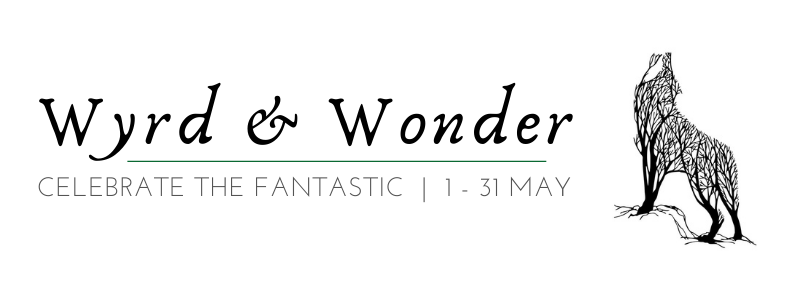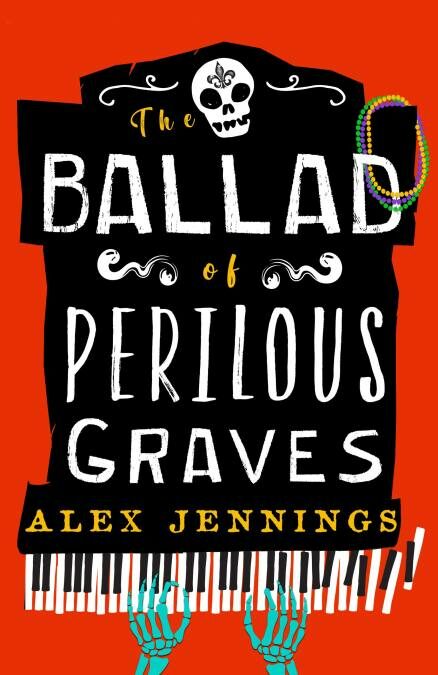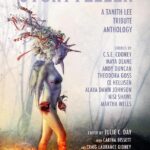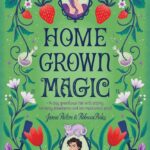

Genres: Fantasy, Contemporary or Urban Fantasy, Queer Protagonists
Representation: Black cast, Black trans MC
Published on: 21st June 2022
ISBN: B09HQLGSSY
Goodreads

In a fantastical version of New Orleans where music is magic, a battle for the city’s soul brews between two young mages, a vengeful wraith, and one powerful song in this vibrant and imaginative debut.
Nola is a city full of wonders. A place of sky trolleys and dead cabs, where haints dance the night away and Wise Women keep the order, and where songs walk, talk and keep the spirit of the city alive. To those from Far Away, Nola might seem strange. To failed magician, Perilous Graves, it’s simply home. Then the rhythm stutters.
Nine songs of power have escaped from the magical piano that maintains the city’s beat and without them, Nola will fail. Unexpectedly, Perry and his sister, Brendy, are tasked with saving the city. But a storm is brewing and the Haint of All Haints is awake. Even if they capture the songs, Nola’s time might be coming to an end.
I received this book for free from the publisher via NetGalley in exchange for an honest review. This does not affect my opinion of the book or the content of my review.
Highlights
~music is magic
~there’s more than one New Orleans
~family’s always got your back
~friends stand by your side against the Storm
~beware the sack
I started this book excited. By the middle I was confused. By the end, I hated and resented it.
I probably should have DNF-ed it instead of pushing on through, but I was so sure it was going to smooth out and become epic. But while it tapped into some big, mythic-level themes, it was much too complicated, confusing, and over-full to be epic-like-awesome.
Outside, sunlight fell like rain. It was so thick, so powerful that Perry expected it to ring as it bounced onto Esplande Avenue.
What you need to know going into Ballad is that there are two New Orleanses: the New Orleans of our world, and Nola, which is New Orleans but magic, attached to our world as a kind of pocket dimension. The biggest, most frustrating thing about Ballad is that this is not explained or clear for the first half of the book. We jump seemingly at random between a city that has flying trams, zombies, and Mardi Gras beads growing from trees, to the mundane New Orleans (if NO can ever be described as mundane) where we follow a Black trans man named Casey living a pretty normal life with no apparent relevance to the plot going on in the magical city. I had no idea why Casey mattered, and to be honest, I still think his character and plotline could and should have been entirely cut from the book – it’s boring, it doesn’t add to the story, and it’s confusing in context.
In Nola, the magical city, three Black kids – Perry, Brendy, and Peaches – are tasked with tracking down and recovering the Nine Songs that, to keep it short, power Nola. The songs have escaped – or possibly been set free by some dangerous enemy – and are now manifesting in human shape. They have to be gathered together again as quickly as possible for everyone’s safety – including their own. For Perry and Brendy, this means discovering and tapping into the gifts of their bloodline; Peaches, on the other hand, has had superpowers for as long as anyone can remember and is absolutely ready to mess some bad guys up.
Warning bells started going off for me around this point, because the title is The Ballad of Perilous Graves, aka Perry – but although this is definitely a coming-of-age story for Perry, he’s far from the only one doing the hero-ing. Brendy even says as much at one point, saying it’s not fair that for no apparent reason Perry gets the better magic (or at least, what everyone thinks, at that point, is the better magic). Titles are not always up to authors, but whoever’s responsible for it, I side-eye headlining Perry when Brendy and Peaches are a lot more than helpful sidekicks.
“Perry. You ever try to pick up a car?”
“…No.”
“Then how you know you can’t?”
This would probably have been an excellent book if it went ahead like that; the problem is that it doesn’t. Jennings has stuffed this book with PoVs and an enormous cast of secondary characters, far too many for me to keep track of or care much about. Then more and more plot devices and quest objects kept coming out of the woodwork, and with all the music references, it was just too much for me. I was rapidly overwhelmed, which made me shut down and stop caring about any of it. I kept reading because I fell in love with Nola, but I grew more and more disenchanted (hah) with the quest.
“You know what your problem is? When a grown-up tell you something can’t be done, you just believe ’em. Don’t you know ain’t even no such thing as grown-ups?”
“What?”
“There ain’t,” she said. “They’re all just old kids, pretending.
The worldbuilding of Nola was delightful; I loved the sky-trolleys and music-magicians and capital-a Animals, the schools of magic and the zombies! Jennings’ imagination is amazing, and honestly I would have been so much happier if the entire story had taken place in Nola. But even then, Ballad would still feel so unbelievably overfull with things. All of which were individually awesome, but packed in together, there just wasn’t room for them all to shine; I couldn’t appreciate all of it because just as something new and fabulous appeared, we were whisked to the next thing.
And…I remain uncomfortable with who and what the villain turned out to be. I’m the whitest of snowflakes and am therefore not even a little bit qualified to talk about race, but I hope BIPOC reviewers talk about it and weigh in.
One thing I really do have to commend Jennings on, though, is the family. I hate stories where parents or guardians are either oblivious to what’s happening to their kids or just hand-wave it all as fine, but here we have a good number of awesome grown-ups who demand to know why their kids have to be the ones in danger; who step in to protect and assist as much as they can. This isn’t one of those adventures where kids are sneaking around trying to hide what’s going on; their family is a wonderful, strong support network, even if it’s the kids who take center stage.
By the end of Ballad, I was furious with it and desperate for the book to just be over. Writing this review a week and change later, I can acknowledge that there is an enormous amount of awesomeness in this book; Jennings has an incredible imagination and a great prose style, and Ballad is beautifully unique in a genre that tends to play with the same tropes over and over. I’m not surprised other early reviews are glowing, and I will be looking out for more from Jennings in the future.
I love a lot of what it does, but the reading experience was, by the end, awful. I encourage other people to give it a go, though, if it sounds at all interesting to you. I really do think Ballad is something special. Maybe I’ll come back to it in a year and adore it.
For now, it’s three stars.





Leave a Reply